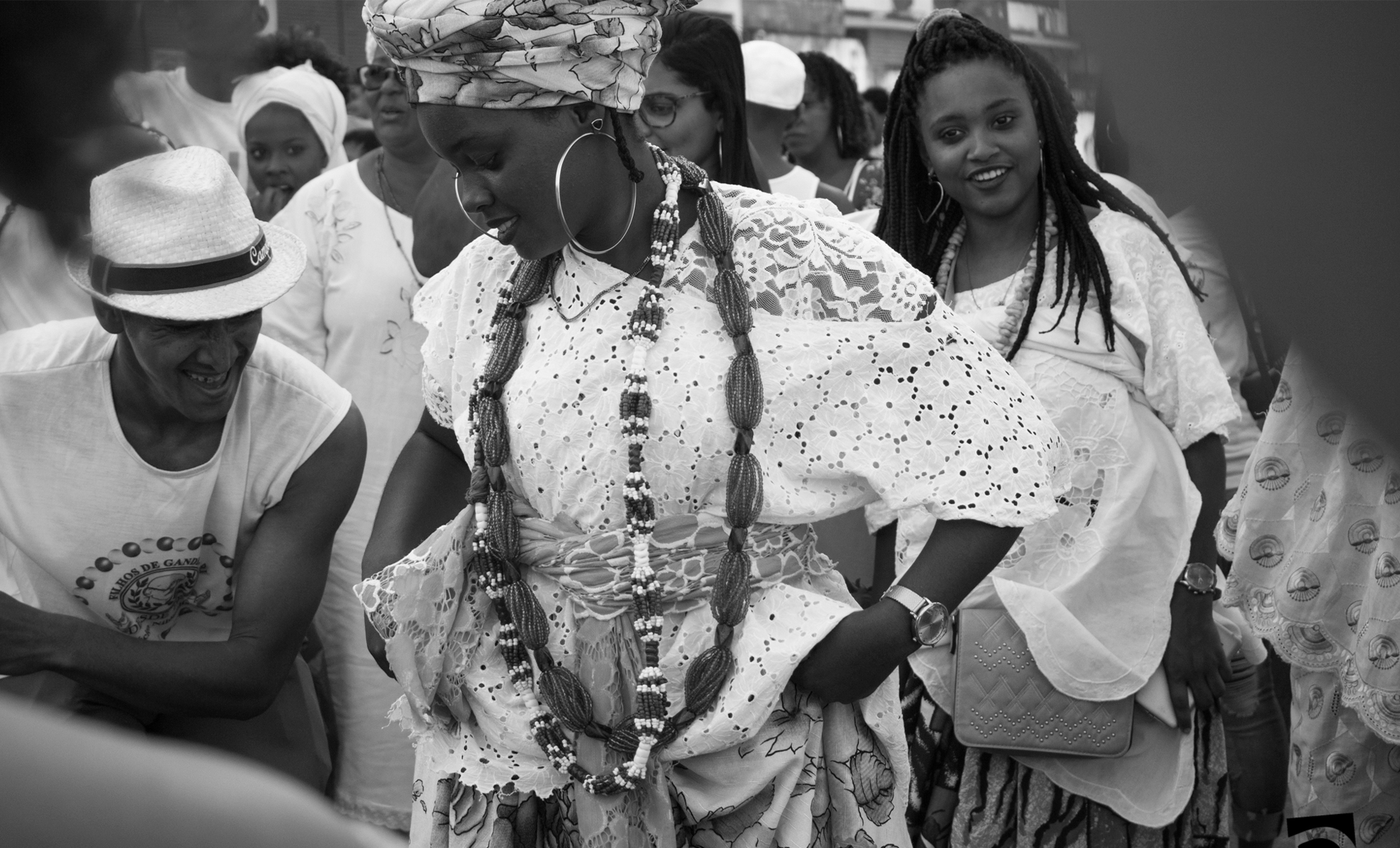




On May 13th, 1888, the Lei Áurea (Golden Law) officially abolished slavery in Brazil, the last country in the Americas to outlaw the system. The end of colonial slavery was driven by economic motivations — the Industrial Revolution created more consumer markets and transformed labor relations, rendering slavery financially unviable. The scarcity of public policies aimed at racial equity, along with the permanence of the laws that violate the rights of black lives, were compounded by the still-fragile commitment of white Brazilians to anti-racism. 133 years later, the fight for guaranteed rights is still primarily carried out by black people.
It is from this historical perspective that black organizations and movements recognize May 13th as a day of visibility and struggle surrounding the unfinished abolition and its consequences for the black population. To present different nuances of this issue, Ibirapitanga spoke with four black leaders from grantee organizations: Sueli Carneiro, from Geledés – Black Women’s Institute; Karen Luise, from IAJ – Institute for Access to Justice; Nathália Oliveira and Dudu Ribeiro from the Black Initiative.
Their reflections informed Ibirapitanga’s content creation process on the repercussions of the unfinished abolition. They offer insights into the current aspects of unfinished abolition in Brazil, as well as strategies being employed by their organizations to confront this reality.
Here are seven aspects to understand and address the issue of unfinished abolition in Brazil, according to Sueli Carneiro, Karen Luise, Nathália Oliveira, and Dudu Ribeiro:
Origins and Echoes
To denaturalize the current condition of the Black population in Brazil, certain points make its roots and consequences clearer.
1. The social chasm between black and white Brazilians originates from the unfinished abolition, marked by the social exclusion of black people through denial of access to rights
Karen Luise points out that “Brazil declared slavery abolished with a law that consisted of just two articles”. The judge sharply and directly denounces an abolition that lacked any real commitment to the emancipation of black people.
This absence of plans for “the day after” May 13th is, in fact, part of a broader project to perpetuate structural racism through a new productive and economic logic.
Sueli Carneiro puts it concisely and precisely: “The inequalities we see today have been historically constructed and are the result of an unfinished abolition. An abolition that was not accompanied by effective policies to include formerly enslaved people, who instead were socially relegated through an eugenic policy of whitening the society, by encouraging European immigration; through exclusionary policies that blocked democratic access to formal education and the labor market for black people, and limited their political participation”.
2. Since abolition, new mechanisms have been created to deepen and sophisticate structural racism
According to Sueli Carneiro, “to this accumulation of historical disadvantages, we must add, in the present day, other mechanisms of racial exclusion that prevent black people from accessing opportunities — especially employment, which is essential for sustaining life”.
She explains that these mechanisms are “the persistent echoes of 19th-century racialism in Brazilian society, which classified and ranked human diversity into superior and inferior races — claims now disproven by science but still present in the social imaginary — producing effects of power, processes of exclusion and subjugation through explicit or covert discriminatory practices and/or by turning a blind eye, especially by those responsible for eradicating or punishing them.”
Focusing on the close relationship between racism and drug policies, Nathália Oliveira and Dudu Ribeiro argue: “We understand that the so-called ‘war on drugs’ carries remnants of a ‘survival’ of slavery, enacted through mechanisms inherited from that system and constantly updated since abolition. It creates a unique black positionality in contemporary society, characterized by gratuitous and structural violence.”
The social scientist and the historian conclude that “the current drug policies, which criminalizes the production and sale of only certain psychoactive substances, ideologically supports major state actions, enjoying broad social acceptance and allowing Black lives to remain devalued.”
3. Labor is a central sphere in this debate
During slavery, forced labor was the backbone of colonial society. After that system eroded, the project to maintain racism left most of the Black population unemployed or in subjugated, low-paying positions.
Karen Luise summarizes: “Among the many impacts on the lives of the enslaved — caused by centuries of exploitation and the granting of freedom without public policies to ensure dignified living conditions — was their entry into the labor market.”
Sueli Carneiro adds: “The promotion of human resources is informed by the persistence of prejudice and stereotypes regarding black labor — due to the stigma of being formerly enslaved, the ideological constructs developed after slavery that alleged an inherent unsuitability of black people for the disciplinary techniques of formal and free labor, justifying their replacement by immigrant workers; or simply due to aesthetic standards imposed by corporate marketing, which, depending on one’s position, could supposedly tarnish the company’s or its products’ image.”
4. Multiple facets of structural racism converge in the justice system
On one hand, educational and hiring dynamics hinder or block the presence of black professionals in the justice system — an institution that mirrors the inverse of the population’s demographic.
“We are all aware of the many difficulties in this area, starting with access to education and the opportunities to occupy socially privileged spaces. Legal careers are among those where Black people face the most barriers. These are expensive courses, requiring extensive preparation, dedication, and time”, explains Karen Luise.
On the other hand, drug policy is used to incarcerate or end Black lives through the militarized arm of the state, which frequently engages in illegal practices that go unpunished by the justice system.
It’s a combination of factors, as explained by Nathália Oliveira and Dudu Ribeiro: “The violent actions of security forces in favelas and peripheries, the absurd incarceration rates, the death toll from the ‘war on drugs,’ and other criminal acts by the state constitute sufficient reasons for Brazil to urgently seek solutions to this complex situation. Yet the inertia in ending this war continues to cost thousands of lives each year, without mobilizing research or producing effective public policies — a result of centuries of racism that have normalized the various forms of violence, especially against black people”.
They further argue that it’s necessary to address “the nature of discriminatory practices in Brazil — which, through the war on drugs, organize mechanisms of racial control — and how these practices interconnect, reinforce, and realign themselves to fulfill a strategic objective: the instrumental face of the Brazilian state’s ongoing genocidal project.”
Movements Toward Completion
Efforts to create change are primarily driven by civil society organizations grounded in a few key understandings of this reality.
5. Intersectionality is crucial to addressing the complex reality of racism in Brazil
Developed historically by female black intellectuals and activists, intersectionality is “a theoretical and methodological framework used to understand the structural inseparability of racism, capitalism, and cisheteropatriarchy, and the interactions that result from it”.
A fundamental example of intersectional action, “Geledés is a civil society organization that defends women and Black people because it recognizes that both groups suffer from disadvantages and discrimination in access to social opportunities due to racism and sexism in Brazilian society”, says Sueli Carneiro.
Geledés’s political and social work prioritizes “racial issues, gender issues, and their implications for human rights, culture and education, health, communications, the labor market, academic research, and public policy”, according to Sueli, who adds: “[Geledés] also takes a stand against other forms of discrimination, such as lesbophobia, homophobia, and transphobia”.
6. Creating and strengthening affirmative action policies is essential to address the immense social gap in starting points between black and white people
Based on this understanding, Sueli Carneiro states: “Geledés joins the struggles of the Black movements to effectively criminalize racism and racial discrimination in their many forms in Brazilian society and defends affirmative action policies in various areas of public policy as a means of eliminating racial inequalities and promoting the social value of the black population”.
Karen Luise highlights the importance of this type of policy through one of IAJ’s initiatives aimed at increasing the number of black professionals in the justice system. The initiative “seeks to combat the challenges arising from lack of access to education and costly programs by offering scholarships and psychosocial support to black people preparing for civil service exams for legal careers (judiciary, public prosecutor’s office, public defender’s office, and others)”. The organization hopes that “those benefiting from this initiative will gain the preparation needed to compete on equal footing with other candidates”.
7. Addressing racial issues is key to effective strengthening of the democratic rule of law, with drug policies reform as a central point of change
Nathália Oliveira and Dudu Ribeiro argue that “the debate around changes to the Drug Law touches on deep, essential questions for the Brazilian people and presents a historic opportunity to review and acknowledge the historical gaps created by racism — gaps that are still painfully reproduced today”.
The first black civil society organization to build a racial and economic justice agenda through drug policy reform is rooted in anti-racism as a path to broader impact.
“Our work seeks, above all, to effectively strengthen the democratic rule of law. Overcoming the current model of prohibition of certain substances under the logic of war would help dismantle transnational structures that corrupt public institutions, jeopardize life in many territories, and undermine peace-building processes”, affirm Nathália and Dudu.
THE LEADERS
Sueli Carneiro is a philosopher with a PhD in Education from the University of São Paulo and the executive coordinator of Geledés – Black Women’s Institute. She is a feminist and anti-racist activist and the author of numerous articles on gender, race, and human rights in both national and international publications. Her most recent book is Escritos de uma vida (Writings of a Life), published in 2018. Sueli also serves on the Board of Directors of Instituto Ibirapitanga.
Karen Luise is a judge at the 1st Jury Court of Porto Alegre, Rio Grande do Sul. She is a member of IAJ – Institute for Access to Justice; the Association of Judges of Rio Grande do Sul; the Association of Judges for Democracy; the Gender, Race, and Diversity Equity Committee of the State Court of Justice of Rio Grande do Sul; and is a faculty member at ENFAM – the National School for the Training and Improvement of Judges.
Nathália Oliveira is a social scientist and co-founder of the Black Initiative. She was director of the É de Lei Harm Reduction Center, where she worked on drug-related harm reduction, education, and project management. She also served as an advocacy advisor for the “Gender and Drugs” project at the Instituto Terra Trabalho e Cidadania (Land, Labor and Citizenship Institute), where she focused on researching the intersection of drug policy and gender-based violations. She was a network coordinator for the Brazilian Drug Policy Platform and currently serves on its advisory board. Nathália was also president of COMUDA/SP – the Municipal Council on Public Policies on Drugs and Alcohol in São Paulo.
Dudu Ribeiro is a historian, co-founder, and executive coordinator of the Black Initiative. He holds a specialization in Strategic Management of Public Policies from UNICAMP/FPA and is currently a master’s student in the Graduate Program in History at UFBA. He has served on the Economic Development Council of the State of Bahia; the State Council on Drug Policy of Bahia; the Drug Policy Working Group of the National Youth Council; the Latin American and Caribbean Network of People Who Use Drugs (LANPUD); and was vice president of the State Youth Council of Bahia.















